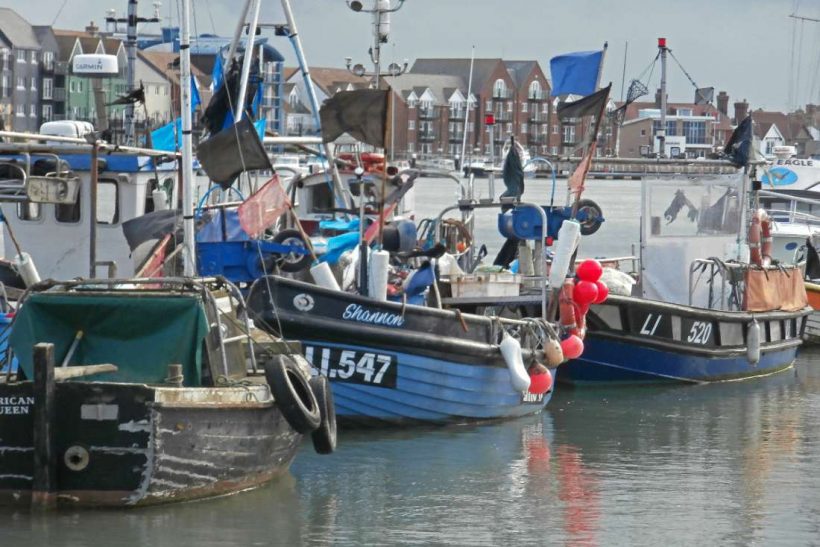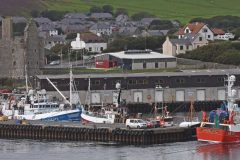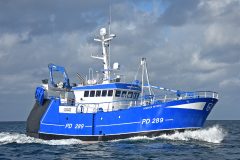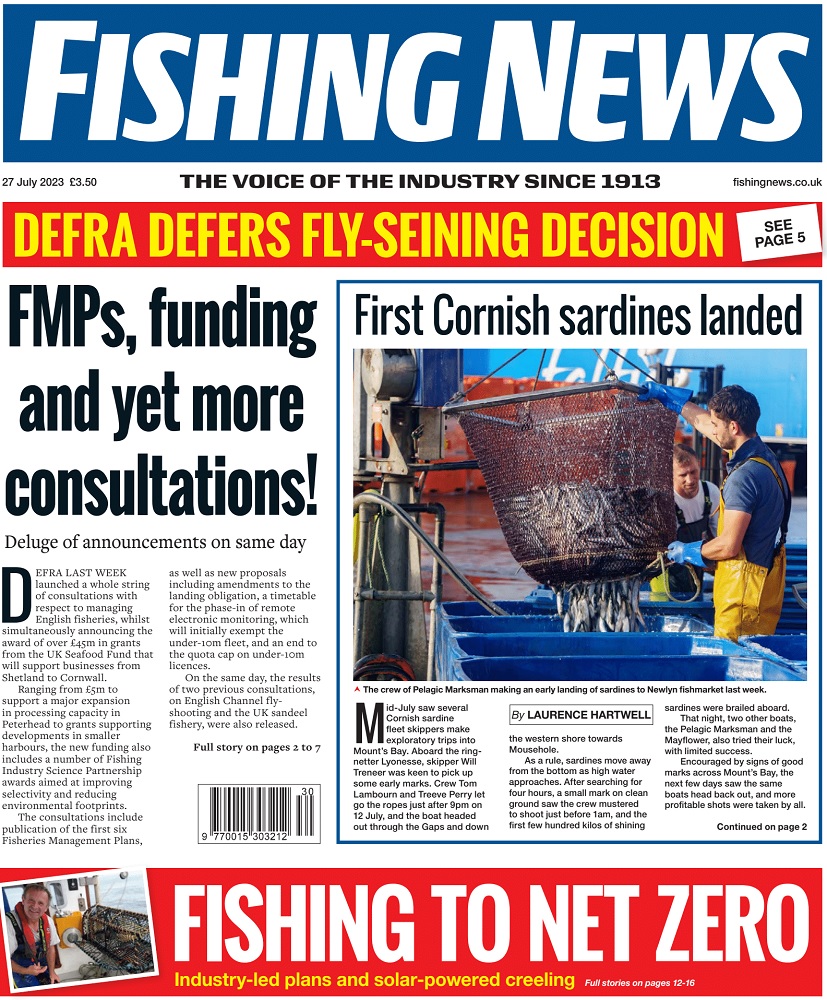To:
Sec. State, DEFRA Andrea Leadsom
NFFO (Chairman Tony Delahunty)
Permanent Sec. Clare Moriarty
SouthernIFCA (+Committee)
Minister of Fisheries, Mr.George Eustice MP
Madeleine Moon, MP for Bridgend
Suella Fernandes, MP for Fareham
Ref: The Inshore Commercial Bass Fishery
This letter is to all administrators governing the Fishing Industry, including some MP’s who have voice and influence over it. We, the Warsash Inshore Fishermen’s Group who have been supported by our MP, Miss Suella Fernandes, request that the issues expressed in this letter and accompanying material be read, thoroughly scrutinised and addressed and that our questions be fully and genuinely answered.
The House of Commons Parliamentary debate on Recreational Sea Bass Fishing took place on 11.01.2016, see pages 1819-1846 at which our MP spoke on our behalf (pages 1837-1839) and who accordingly delivered to us a copy of that debate. Subsequently, the Warsash Inshore Fishermen’s Group ‘Open Letter’ to Fisheries Minister Mr George Eustice and our accompanying ‘Analysis’ of the RSA Debate was published in full by the Fishing News on the 14 April 2016. The ‘Analysis’ is now available online here.
It has been several months since our publications have been available and open to public scrutiny, with no comment so far from conservation and angling groups such as Bass Anglers Sports Fishing Society (BASS) and many others whose apparent aims are to undermine and manage the bass fishery.
But, we have thankfully received a very supportive response from the Minister Mr George Eustice via our MP Miss Suella Fernandes. He very much encourages small scale, low impact inshore fisheries and methods. Now that the new reformed Common Fisheries Policy is in place – which puts the emphasis on enhancing ports like Warsash – any advancement in fishing gear or methods that will promote sustainability and improve selectivity to achieve the new minimum landing size (mls) of 42cm for bass and help conservation, we also support. Our response has been an expensive replacement of gill net to suit the new measures.
Regarding the House of Commons debate on RSA and some of the criticisms we voiced regarding the spurious and incorrect facts cited by some MP’s in favour of replacing commercial bass fishing with a recreational one, a good example would be from MP for Bridgend, Mrs Moon (page 1829 of the RSA Debate) and her views on gill nets.
Quote: “Those outside this place who have never had the joy of seeing a gillnet should be made aware that it leads to a violation of the EU fish size regulations by allowing for the catch of undersize fish which are then thrown back dead. They do not help conserve fish stocks because the undersize fish, the next generation of fish, are thrown back dead.”
As we have suggested in our ‘Analysis of the Debate’ Mrs Moon, MP, needs to re-educate herself on the subject of gill nets for bass before she makes a public statement in the House of Commons. She later describes them as ‘conservation-damaging’ (page 1829). MP’s were allegedly ‘briefed’ by the Angling Trust prior to this debate. However, in that same briefing no mention of the size selectivity of gill nets were made.
The following is to illustrate, by example, how Mrs Moon failed to project the facts of a functioning bass gill net, resulting in seriously misleading the House of Commons (at the expense of commercial fishermen) on the 11.1.2016, by projecting a vague description and false impression several times.
Mrs Moon:
- failed to give an accurate description of a functioning gill net.
- failed to mention what target species she was referring to, (but the inference is it is bass.)
- failed to mention the importance of mesh size regarding fish size selectivity and just how size selective gill nets in general can be (especially drift nets).
Mrs Moon – in common with other MP’s in that debate who also made spurious comments (critiqued in our ‘Analysis’) – can have no excuses for misleading the House of Commons. There are far too many (intended?) deviations for her to defend. As a responsible MP, it is her duty to obtain the correct facts. We demand to know where this erroneous information came from.
Authorities like Southern Inshore Fisheries and Conservation Authority (SIFCA) have evidence on gill nets used for bass, which would confirm (as they have already confirmed with us) that gill nets are highly size-selective (for bass and other fish also). Those are the facts, but Mrs Moon chose not to gain confirmation of those facts or to disclose to the House whether or not she was referring to an illegally deployed gill net or not. An illegal net, with small mesh, will of course catch an undersize bass.
We suggest that these people stop misleading and deceiving those in the public and in high office and gather the facts before peddling deception against this worthy industry of food producers.
We now require that the authorities involved in this industry and connected organisations; DEFRA, MMO, IFCA’s, take note of our grievances and deal with these corrosive issues and that the House of Commons MP’s who have mislead the House on these issues, do so likewise and correct all those misleading statements pertaining to the fishing industry that were voiced in the aforementioned debate on RSA 11.1.2016.
All misleading errors should be withdrawn, corrected and a full written apology to the fishing industry be forthcoming. These apologies and corrections should be issued to the fishing industry through the Minister and a copy sent to the Fishing News for publication. We at the Warsash Fishermen’s Group feel fully justified in asking for these corrections since we, in common with all inshore fishermen who use nets, are being irreversibly tarnished by these propagated errors.
Here is an example of the size selectivity of a gill net:
A typical local day’s gillnet fishing with a small quantity of surface gillnet designed to target a 42cm bass, the new regulation size, resulted in ZERO under-regulation size fish. This is a good example of just how selective gillnets can be. The yield of regulation size for that day was 15 bass and 32 mullet. The deployment was from one of our small inshore vessels which can only safely carry a very short length of net, not the ‘three miles of net’ regularly claimed by some misguided anti-gillnet campaigners.
Anti-gillnet campaigners such as Mrs Moon and others are constantly and disingenuously insinuating that fishermen are using gill nets to catch juvenile fish. Furthermore, they are inciting members of the public/stakeholders to put pressure on the IFCA’s to shut down inshore netting by alluding to gillnetting for ‘juvenile’ bass. Here is an example:
BASS (Bass Anglers Sports Fishing Society):
Quote: “We urgently need to protect juvenile bass, salmon and sea trout in order to regenerate the stocks to safe levels as quickly as possible.
“Stopping netting in rivers and estuaries is vitally important to help juvenile bass, salmon and sea trout survive to maturity and reproduce.”
And The Angling Trust:
Quote: “The bad news is that netting seems to be on the increase and is even occurring in supposedly ‘protected’ bass nursery areas with mullet being used as an excuse for hauling in by-catches of juvenile bass.”
These people should be made to explain to their supporters (and the House of Commons) that a fundamental property of gill nets is that they are highly size-selective. All the myths and lies being publicly propagated by some MP’s and lobby groups that it is gill nets that are killing juvenile bass and should be entirely banned should take advice from our Southern IFCA on the subject and withdraw those claims. They would be able to confirm that providing the correct mesh size is used for the target regulation legal size, gillnets are highly selective. We have established that also ourselves through actual fishing practice.
There needs to be a clear recognition that small inshore vessels, only able to deploy small lengths of net, represent the lower impact/size vessel part of the inshore fleet.
This above point is really important, since any legislation pushed through (without full consideration of the facts pertaining to gill nets) will affect these boats more than the more capable under 10m inshore vessels.
There are many corrosive myths stealth-fully being targeted at our fisheries management, especially pertaining to the inshore bass gill net fishery, that are designed to have a retrograde effect on that fishery. Bass campaigners and now MP’s are busy propagating an agenda to claim that bass species exclusively for a recreational designation. Mrs Moon MP, Mr Mann MP, Mr Walker MP and others are obviously enhancing angling lobby groups’ agendas by making bias and erroneous statements in the House Of Commons, misleading the House and tarnishing the Fishing Industry. These important issues that we are raising must be now investigated rigorously and accordingly corrected.
Another point must also be considered: Regulation size for Bass (MLS) has continued to rise for decades, and inshore bass gill net fishermen have adjusted their nets accordingly to suit any increase in bass mls and at great expense. Assuming that the definition of a juvenile is below 42cm, we do not catch juvenile fish and we do not want to catch them. Anti-gillnet campaigners must acknowledge these facts and announce them. They should reflect on the fact that blind demonization of licensed fishermen who use nets, (for all sorts of fish species) will no longer be tolerated.
The reported mortality of catch and release bass by usual sport angling methods is anywhere between 3 and 5% depending on the study, but may be as high as 9%.
This mortality of bass is increased with a number of factors including small hook size and young fish age. It is well known that angling off a shoreline generally requires a smaller, lighter hook. It is also well known that juvenile bass favour shallow, inshore waters and are therefore unavoidably a target. The problem is there is a tendency for small bass to swallow the bait whole. Even if hook extraction is successful there is a significant possibility that the stress will kill the fish. Bass under mls 42cm caught with smaller hooks from shoreline, pier or awkward rocky terrain will result in a high degree of stress. A deep-set hook in the gullet of the fish will significantly increase the above quoted mortality figure. Treble hooks are also problematic.
There is a gross irony here. A selective bass gill net produces near zero juvenile bass compared to an average beach angler for example, who may well hook a considerable number of juvenile bass in an average session. This is even more significant considering the high number of inshore beach anglers represented as a portion of the 900, 000 recreational sea anglers.
This really does ‘cast’ a completely different light upon this whole debate, and it is one that the stakeholder- public should seriously weigh up against the usual dogma held against net fishermen.
We are sending a copy of this letter to our local IFCA (Southern IFCA) so they can see how we feel about these public misrepresentations. This is also poignant as the angling lobby group BASS is represented on SIFCA’s Committee. Since the BASS representative has been appointed by the MMO, and his organisation is openly calling on stakeholders and members of the public to make representations to the IFCA’s with the aim to shut down inshore gill netting (again, by disingenuously making allusions to the catching of juvenile bass in nets), it is even more incumbent on them (BASS), responsible authorities and MP’s to make clear, unambiguous statements to the stakeholder public concerning the selectivity and conservation attributes of gillnets when used in a balanced, responsible way.
In conclusion, and in addition to our request to Mrs Moon, MP, we once again appeal to fishing authorities to publish the facts about the selectivity of gill nets and address our grievances. More importantly, we demand to know precisely where these misrepresented anomalies came from. It is our sincere hope that all negative campaigners against gillnet fishermen will gain a more balanced, less dogmatic view and stop eluding these facts.
Yours sincerely,
The Warsash Inshore Fishermen’s Group


To: Sec. State, DEFRA Andrea Leadsom NFFO (Chairman Tony Delahunty) Permanent Sec. Clare Moriarty SouthernIFCA (+Committee) Minister of Fisheries, Mr.George Eustice MP Madeleine Moon, MP for Bridgend Suella Fernandes, MP for Fareham Ref: The Inshore Commercial Bass Fishery This letter is to all administrators governing the Fishing Industry, including some MP’s who have voice and influence over it. We, the Warsash Inshore Fishermen’s Group who have been supported by our MP, Miss Suella Fernandes, request that the issues expressed in this letter and accompanying material be read, thoroughly scrutinised and addressed and that our questions be fully and genuinely answered. The House of Commons Parliamentary debate on Recreational Sea Bass Fishing took place on 11.01.2016, see pages 1819-1846 at which our MP spoke on our behalf (pages 1837-1839) and who accordingly delivered to us a copy of that debate. Subsequently, the Warsash Inshore Fishermen’s Group ‘Open Letter’ to Fisheries Minister Mr George Eustice and our accompanying ‘Analysis’ of the RSA Debate was published in full by the Fishing News on the 14 April 2016. The ‘Analysis’ is now available online here. It has been several months since our publications have been available and open to public scrutiny, with no comment so far from conservation and angling groups such as Bass Anglers Sports Fishing Society (BASS) and many others whose apparent aims are to undermine and manage the bass fishery. But, we have thankfully received a very supportive response from the Minister Mr George Eustice via our MP Miss Suella Fernandes. He very much encourages small scale, low impact inshore fisheries and methods. Now that the new reformed Common Fisheries Policy is in place – which puts the emphasis on enhancing ports like Warsash – any advancement in fishing gear or methods that will promote sustainability and improve selectivity to achieve the new minimum landing size (mls) of 42cm for bass and help conservation, we also support. Our response has been an expensive replacement of gill net to suit the new measures. Regarding the House of Commons debate on RSA and some of the criticisms we voiced regarding the spurious and incorrect facts cited by some MP’s in favour of replacing commercial bass fishing with a recreational one, a good example would be from MP for Bridgend, Mrs Moon (page 1829 of the RSA Debate) and her views on gill nets. Quote: “Those outside this place who have never had the joy of seeing a gillnet should be made aware that it leads to a violation of the EU fish size regulations by allowing for the catch of undersize fish which are then thrown back dead. They do not help conserve fish stocks because the undersize fish, the next generation of fish, are thrown back dead.” As we have suggested in our ‘Analysis of the Debate’ Mrs Moon, MP, needs to re-educate herself on the subject of gill nets for bass before she makes a public statement in the House of Commons. She later describes them as ‘conservation-damaging’ (page 1829). MP’s were allegedly ‘briefed’ by the Angling Trust prior to this debate. However, in that same briefing no mention of the size selectivity of gill nets were made.




